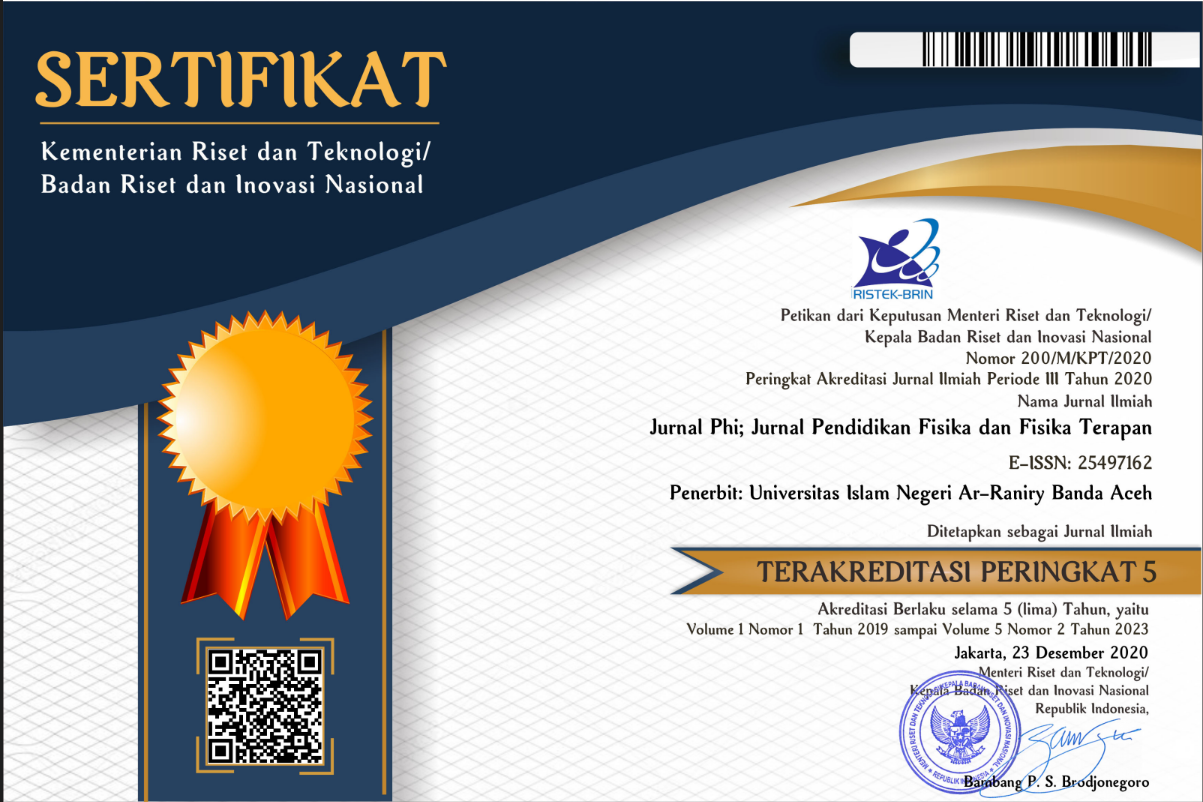Analysis of Physics Learning Outcomes Based on High School Students' Learning Styles: A Meta-Analysis Study
Abstract
Learning physics in senior high school is often a challenge because the material requires theoretical and mathematical understanding, especially if the learning method does not pay attention to the learning style of students. This study aims to analyze articles related to physics learning outcomes based on the learning styles of high school students using a meta-analysis approach. This research is a meta-analysis of previous research published in the 2015-2024 timeframe. This research provides guidance for teachers in designing effective learning strategies according to the needs of students. The results showed that visual learning style is the most dominant in supporting physics concept understanding, followed by auditory style, and finally kinesthetic style. However, other factors such as motivation and teaching methods also affect learning outcomes. The conclusion of this study states that learning style is not the only factor that affects physics learning outcomes. A multimodel learning approach is important to improve learning outcomes effectively and inclusively.
Keywords
Full Text:
PDFReferences
Afelia, Y. D., & Utomo, A. P. 2023. Analysis of Learning Styles of Class X Students of SMAN 1 Bangorejo in Implementing Differentiated Learning in the Independent Curriculum. Journal of Educational Technology. 1(2), 1-9.
Aini, N., Putri, H. D., Azizati, B. S., & Rokhmat, J. 2024. Analysis of Learning Styles and Student Learning Outcomes on Newton's Law Material. Contextual Natural Science Education Journal. 2(1), 25-31.
Angrasari, F. 2018. Relationship between Learning Style and Physics Learning Outcomes of Class X MIA Students at SMA N 2 Takalar. Journal of Physics Education. 6(2), 225-234.
Asriyanti, F. D., & Janah, L. A. 2018. Analysis of learning styles in terms of student learning outcomes. Education Science: Journal of Educational Theory and Practice Studies. 3(2), 183-187.
Azis, F. R. N., Pamujo, P., & Yuwono, P. H. 2020. Analysis of Visual, Auditorial, and Kinesthetic Learning Styles of Achievement Students at Ajibarang Wetan State Elementary School. Journal of BK An-Nur Students: Different, Meaningful, Noble. 6(1), 26-31.
Damayanti, A. 2022. Factors Affecting the Learning Outcomes of Students of Economics Subjects Class X Sma Negeri 2 Tulang Bawang Tengah. In Proceedings of the National Seminar on Economic Education. 1(1), 99-108.
Febriani, S., Taufik, M., & Verawati, N. N. S. P. 2019. The effect of guided discovery learning model with experimental method on physics learning outcomes of MAN 1 Mataram students in terms of VAK learning style. Journal of Physics and Technology Education. 5(1), 82-90.
Gunawan, G., Harjono, A., & Imran, I. 2016. The Effect of Interactive Multimedia and Learning Style on Students' Mastery of the Concept of Heat. Indonesian Journal of Physics Education. 12(2), 118-125.
Kadir, F., Permana, I., & Qalby, N. 2020. The effect of student learning styles on the physics learning outcomes of PGRI Maros High School. Karst: Journal of Physics Education and Its Applications. 3(1), 1-5.
Khadijah. 2013. Learning and Learning Objectives of Learning and Learning. Bandung, Citapustaka Media
Hamalik, Oemar. 2019. Curriculum and Learning. Jakarta, Bumi Aksara
Hasana, N. 2016. Qualitative Meta-Analysis Thesis of Student Thesis Based on Inquiry Biology Database Unnes 2014.
Semarang
Kurniati, A., Fransiska, F., & Sari, A. W. 2019. Analysis of Students' Learning Styles in Indonesian Language Subjects in Class V of State Elementary School 14 Manis Rayakecamatan Sepauk 2018/2019. Journal of Perkhasa Basic Education: Journal of Basic Education Research. 5(1), 87-103.
Lubis, M. S. 2021. Learning and Teaching as a Process of Progressive Education. Journal of Literacyology. 5 (2), 95-105. Marpaung, J. 2015. The influence of learning styles on student learning achievement. KOPASTA: Journal of the Counseling Guidance Study Program. 2(2).
Mudah, N. U. 2023. Analysis of Learning Style Characteristics of Students of Class X5 IPA SMAN 1 Surakarta. Journal of Muara Education. 8(1), 67-73.
Junita, N., Desnita, D., Asrizal, A., & Gusnedi, G. 2024. Analysis of the relationship between learning styles and creativity with high school Physics learning outcomes. ORBITA: Journal of Physics Education and Science. 10(1), 43-51.
Nurdiana, N. 2021. The relationship between critical thinking skills and physics learning outcomes in terms of learning styles of students in class XI MIA SMA Negeri 2 Pangkep (Doctoral dissertation, Makassar State University).
Nurnaifah, I. I., Akhfar, M., & Nursyam, N. 2022. The Effect of Learning Style on Student Physics Learning Outcomes. Al-Irsyad Journal of Physics Education. 1(2), 84-92.
Rusman. 2017. Learning and Learning Oriented to Educational Process Standards. Jakarta, Kencana
Sahri, M., & Zulkarnaen, Z. 2022. Identification of Learners' Characteristics as a Reference for Physics Learning Planning at SMA Negeri 2 Samarinda. In Proceedings of PPG National Seminar, Mulawarman University. Vol. 3, pp. 117-120.
Susilawati, S. N., & Yani, A. 2019. Science Process Skills, Learning Styles, and Physics Learning Outcomes. Vidya Karya. 34(2), 170-180.
Widiawati, S., Hikmawati, W., & Wahyudi, W. 2018. The effect of group investigation (GI) type cooperative learning model on physics learning outcomes in terms of student learning styles. Journal of Physics and Technology Education. 4(1), 49-55.
Yulianci, S., Gunawan, G., Doyan, A., & Febriyanti, F. 2019. The Effect of Learning Style on Students' Mastery of Physics Concepts on the Material of Magnitude and Measurement. Journal of Mathematics and Natural Sciences Education. 9(2), 123-127.
Yulianci, S., Nurjumiati, N., & Asriyadin, A. 2020. Analysis of VAK (Visual, Auditory, Kinesthetic) Learning Style Characteristics of Students in Physics Learning. Journal of Mathematics and Natural Sciences Education. 10(1), 40- 44.
DOI: http://dx.doi.org/10.22373/p-jpft.v11i1.27486
Refbacks
- There are currently no refbacks.

This work is licensed under a Creative Commons Attribution-NonCommercial 4.0 International License.
OFFICE:
Gedung Fakultas Tarbiyah dan Keguruan, Universitas Islam Negeri Ar-Raniry Banda Aceh. Jalan Syeikh Abdul Rauf, Syiah Kuala, Kopelma Darussalam, Syiah Kuala, Kota Banda Aceh, Aceh, 23111. email: jurnal.phi@ar-raniry.ac.id
This work is licensed under a Creative Commons Attribution-ShareAlike 4.0 International License



.png)
1.png)
.png)

.png)





